Coronavirus Australia live news: Labor states seize on GDP to justify hard borders
Queensland and WA Labor treasurers ignore mining figures to say their border closures have helped prop up their states, as economy contracts 7pc.
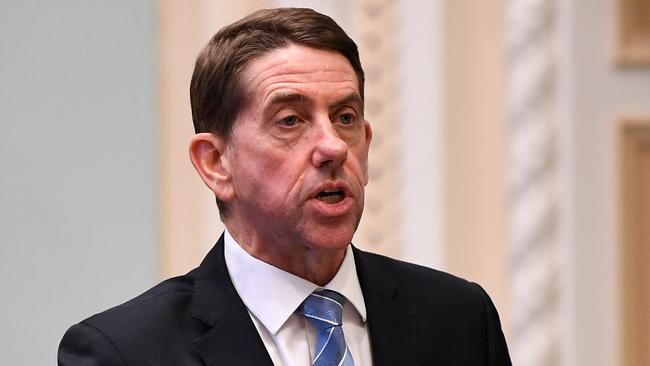
- Economy contracts 7pc
- 17 cases as Sydney cluster grows
- Andrews’ emergency power slammed
- Victoria records 90 new cases
Welcome to The Australian’s rolling coverage of the ongoing coronavirus pandemic.
The Queensland and Western Australian Labor treasurers have seized on the latest GDP figures to declare their respective border closures have helped prop up their states.
Treasurer Josh Frydenberg has warned the Victoria lockdown will bring worse economic news after Australia’s GDP contracted by 7 per cent during the June quarter. The figure confirms the nation’s first recession since the early 1990s as the COVID-19 crisis dealt the country its most severe economic blow since World War II.
Victoria records 90 new cases and six deaths, NSW records 17 new cases.
Adam Creighton 10.15pm: Not bad when you look at rest of the world
Despite a historic contraction in GDP that has tipped Australia into recession, the economy has performed far better than almost all others around the world.
Patrick Commins 9.45pm: Mammoth spending fall drove GDP down
A massive fall in consumption was almost single-handedly responsible for Australia’s deepest economic contraction on record.
Tom Dusevic, Angelica Snowden 9.20pm: Young to bear the brunt of jobs pain
Gen Z, born after 1996 and living through their first recession, are about to be crowded out of the jobs mosh by their parents and Millennials.
Tom Kington 8.55pm: Venice festival aiming to refloat film industry
Parties are banned and temperature checks compulsory but the Venice Film Festival aims to relaunch the cinema industry in style.
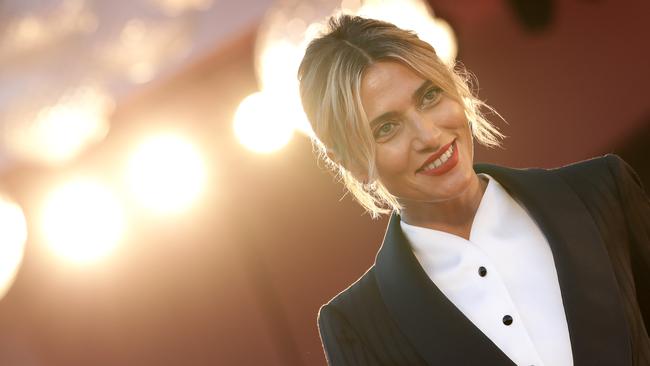
Geoff Chambers 8.30pm: Business calls for urgent tax cuts
Australia’s largest business and employer groups are urging the government to bring forward income tax cuts to stimulate the economy.
Donald L. Luskin 7.50pm: Lockdown experiments have failed
New data suggest that social distancing and reopening haven’t determined the spread of COVID-19.
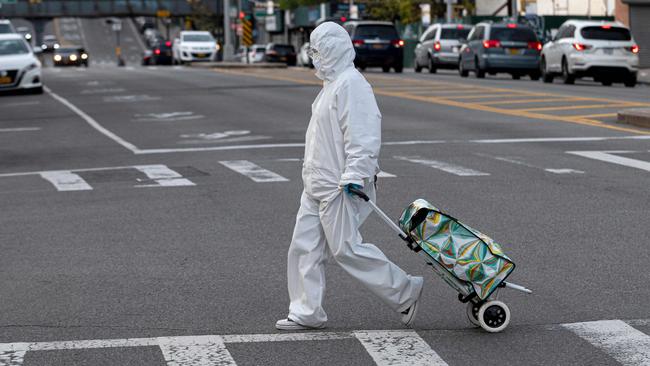
AFP 7.20pm: First case in Greece’s main migrant camp
Greece has announced a first coronavirus infection in its largest migrant camp of Moria on the island of Lesbos, where nearly 13,000 asylum seekers live in unsanitary conditions.
“A 40-year-old Somali man has tested positive,” a migration ministry source said on Wednesday.
READ MORE: Venice festival aiming to refloat film industry
AFP 6.50pm: Maldives tightens tourist rules after spike
The Maldives has tightened entry requirements for tourists after a spike in coronavirus infections at more than a dozen resorts, the foreign ministry said Wednesday.
The Indian Ocean archipelago re-opened its luxury resort islets in mid-July after a months-long lockdown, and did not require visitors to be tested or carry virus-free certificates when entering the country.
Since then, 29 local staff and 16 foreigners have tested positive at the resorts, officials said, where they were also being isolated.
Under the new guidelines, all tourists will be required to present a negative Covid-19 test result on arrival.
Tourism is the major economic driver for the Maldives, a tropical island paradise popular with honeymooners and celebrities.
Authorities had hoped tourists would flock back to the archipelago of 1,190 tiny coral islets after international flights restarted.
But only 5,200 tourists visited the country in the month since July 15 -- a fraction of the pre-pandemic 141,000 monthly average.
Meanwhile, the Maldives recorded more than 1,000 new infections in just the past week to take the total number of cases to 8,003.
READ MORE: Why Australia’s 2020 recession is one like no other
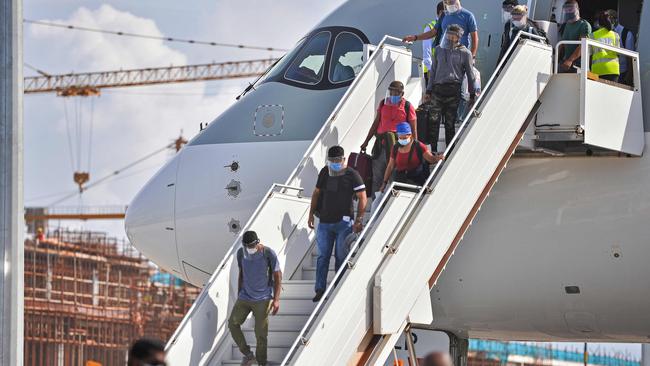
Rachel Baxendale 6.19pm: Victoria’s DHHS publishes genomic sequencing
Victoria’s Department of Health and Human Services has finally published genomic sequencing linking 99 per cent of the state’s current cases to breaches at the Rydges and Stamford Plaza quarantine hotels.
The report has been published more than a fortnight after its authors gave evidence at the Board of Inquiry into the Andrews government’s bungled hotel quarantine program, and more than two months after Premier Daniel Andrews cited sequencing linking “at least a significant proportion” of Victoria’s caseload to breaches in hotel quarantine in announcing the inquiry.
On August 21 Mr Andrews’s office confirmed he had asked DHHS to prepare to publish the sequencing, after claiming for more than seven weeks that the data belonged to the Doherty Institute, despite being commissioned by DHHS, and was not the department’s to release.
Late on Wednesday afternoon, the report was published on the DHHS website.
The key details in the report were already made public at the inquiry a fortnight ago.
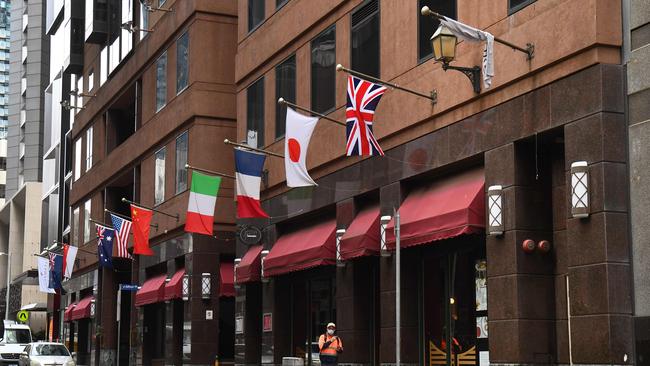
They include:
- “Almost all of the current cases in Victoria (where the sequence is known) are related to the Rydges Hotel cluster. This hotel was used to quarantine individuals returning from overseas. From the genomic and epidemiological data, we know that a family of four who returned from overseas and were quarantining within the hotel, were the first to become unwell in this genomic cluster. Because this family became unwell very shortly after arriving home, it is likely that they acquired infection overseas.”
- “The Stamford Hotel cluster is the other source of current cases in Victoria. This hotel was also used for quarantine for individuals returning from overseas. From the genomic and epidemiological data, we know that three people who returned home to Australia and were quarantining within the hotel were the first to become unwell in this genomic cluster. It is likely then these people acquired coronavirus overseas. From 21 February to 14 August 2020 there are 110 cases associated with this genomic cluster.”
- “Of the 5,395 samples of coronavirus that we had genomic data to 14 August, 3,594 are associated with the Rydges Hotel cluster and 110 are associated with the Stamford Hotel cluster.”
- “More recent data indicates that for the 1,589 cases sequenced from cases with symptom onset from 14 July to 14 August, all but 12 were linked to Rydges. The other 12 cases are linked to the Stamford Hotel cluster. It is likely that 99% of current cases of Covid-19 in Victoria have arisen from the Rydges or Stamford Plaza hotels.”
READ MORE: Aussies given access to ‘last resort loans’
Rachel Baxendale 5.44pm: Regional Victorian town records 10 new cases
Victoria’s Department of Health and Human Services has confirmed late on Wednesday it is investigating 10 new cases of coronavirus in the southwest regional Victorian town of Colac.
The cases include a staff member at Bulla Dairy Foods, which employs 500 people in the town. Colac has a population of approximately 13,000.
The Australian understands the new cases are additional to the total of 12 active cases in the Colac-Otway local government area that were included in Wednesday’s official coronavirus figures - one more active case than on Tuesday.
“We are currently investigating ten new positive cases of #COVID19 in the Colac region,” DHHS tweeted.
“A staff member from the Bulla Family Dairy team in Colac is among those who has tested positive.
“Barwon Health’s contact tracing team is working to determine all potential close contacts.”
We are currently investigating ten new positive cases of #COVID19 in the Colac region.
— VicGovDHHS (@VicGovDHHS) September 2, 2020
A staff member from the Bulla Family Dairy team in Colac is among those who has tested positive. Barwon Health’s contact tracing team is working to determine all potential close contacts. pic.twitter.com/7IzFVwNOIQ
The Australian Lamb Company abattoir, one of Colac’s other largest employers, was previously linked to a cluster of 83 COVID-19 cases.
As of Wednesday there had been a total of 104 known cases of COVID-19 in Colac-Otway since the pandemic began.
The region’s first ever case was detected in July in a person linked to the abattoir.
READ MORE: When TV news is bad news
Rachel Baxendale 5.20pm: Andrews ‘accountable’ for second wave hit to economy
Asked whether he accepted responsibility for the part Victoria’s deadly second wave of coronavirus has played in Australia’s first recession in almost 30 years, Premier Daniel Andrews said he was “ultimately accountable”, but focused on recovery.
“I’m acutely conscious, and I’m ultimately accountable for not just the way the virus has presented, the challenges we’ve faced, some of the mistakes that have been made, but I’m also absolutely responsible and accountable for the recovery plan that we put in place also,” Mr Andrews said.
“There’s a lot of work going into that, and that will be an historic and an unprecedented level of investment, because that’s what’s needed right now, whether it be to drive economic activity or to pay down the borrowings that we just simply have to go into.
“There’ll be no paying down debt until the economy starts growing again. That’s just a fact. That’s what the governor of the Reserve Bank tells us, that’s what Steven Kennedy, the head of the Treasury tells us, that’s what the Prime Minister announced after the last national cabinet meeting.
“But at the moment, if I can kind of order all the different responsibilities and all different accountabilities that I have, the thing that I’m most acutely focused on at the moment is getting this roadmap right, and just continuing to make the point that unless it’s done, safe, and steady, it’s just not going to work, and there’ll be no economic recovery until it does.
“We have to do this right, and I’m confident we can, because I think that my sense is that the vast, vast majority of Victorians, they want their pain, and their sacrifice, and their hard work to count for something.
“They don’t want it to be out of control again in just a few weeks or a few months’ time. That’s why we’re all focused on trying to prevent that, doing everything we can to stop that from happening.”
Asked how confident he was that Victoria would not experience a third wave of infections, given all of the second wave has been linked to breaches in his government’s hotel quarantine program, Mr Andrews said: “As confident as you can be.”
“There’s no certainties in this, other than I think this one: if you would open up too much too fast, then there will be a third wave.
“That very act of not properly defeating the second wave will be the starter’s pistol on the third wave.”
READ MORE: Benson: Bad news with more to come
Ben Packham 5.01pm: ‘Last resort’ loans for Aussies trapped overseas
Australians trapped overseas by the COVID crisis will be able to get access to new government loans to buy airline tickets and cover their living costs while they wait for flights.
Foreign Minister Marise Payne announced the new “last resort” loans on Wednesday as her department compared there were now 23,000 Australians stuck overseas who wanted to come home.
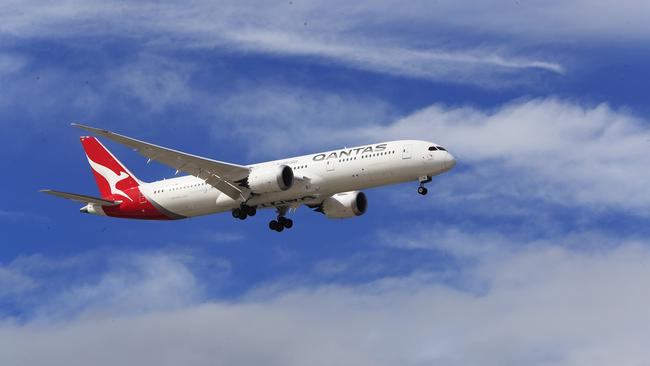
“Applicants will have to meet strict eligibility criteria to access a loan, and only the most vulnerable Australian citizens still overseas will be provided financial assistance,” she said.
Read the full story here.
Rachel Baxendale 4.22pm: LGAs record increase in cases despite state drop
One Melbourne local government area has recorded a net increase of 12 active coronavirus cases in the 24 hours to Wednesday, and seven others have had net increases, despite the number of active cases in the state falling by 104 over the period.
Hobsons Bay - which takes in suburbs including Williamstown, Newport, Spotswood, Altona and Laverton in Melbourne’s inner southwest - had a net increase of 12 active cases on Wednesday and now has a total of 82 active cases.
Bayside, which takes in Brighton, Hampton, Black Rock, Sandringham, Beaumaris and Cheltenham in the city’s southeast, had a net increase of three active cases to a total of 68.
Other council areas with single digit increases included Darebin in Melbourne’s north, Kingston in the southeast, Boroondara in the inner east, Colac-Otway and Corangamite in southwest regional Victoria and Moira in the state’s north.
Wyndham, in Melbourne’s outer southwest, recorded the sharpest fall in active cases with a net decrease of 13, but remains the state’s most covid-riddled LGA, with 263 active cases, down from a peak of 929 active cases on August 12.
Other LGAs with double digit net decreases include Whittlesea in the outer north, where active cases fell by 11 to 130, and the southwest regional Victorian centre of Greater Geelong, where active cases fell by 10 to 40.
The number of active cases in regional Victoria fell by 14 in the 24 hours to Wednesday to 125, while the total number of active cases in the state fell by 104 to 2415.
READ MORE: Guards’ roles changed ‘drastically’
Richard Ferguson 3.55pm: COVID hotspot definition ‘very challenging’
Deputy chief medical officer Nick Coatsworth concedes it will be “very challenging” to reach an agreed country-wide definition of a COVID hotspot, as Friday’s meeting of national cabinet looms.
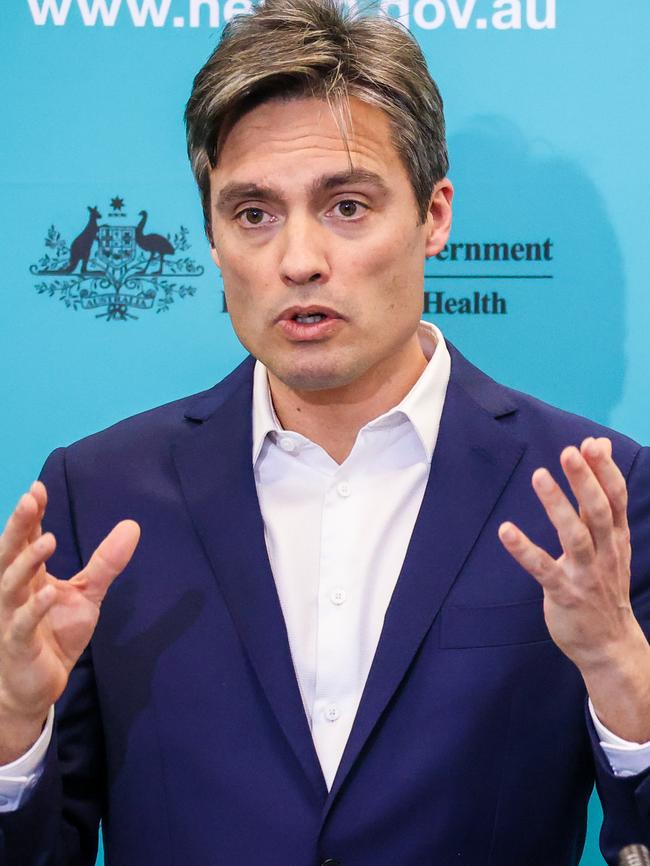
Scott Morrison is hoping for a breakthrough on a hotspot definition in the hope it will lead to the relaxation of internal state borders, but premiers are already pushing back.
Dr Coatsworth said in Canberra that he was optimistic about an agreed definition of hotspots, but admitted there were a lot of factors that will influence if any decision in made by the Prime Minister and premiers.
“It’s certainly very challenging to adopt a national definition of a COVID hotspot but it may well be something that we need to do,” he said.
“Is it about travel across interstate borders? Is it about the public health measures that an individual state is going to introduce in response to one, two, five or 10 cases? T
“There are different reasons why you might want to define a hotspot and the reasons why you wanted to find the hotspot affects the definition. And that sounds a bit like a circular argument and that’s because it is.
“You really have to take into account not just the numbers, but also the circumstance surrounding COVID-19 cases.
“I’m always an optimist. And this is a decision of national significance. And appropriately our national leaders will be discussing it on Friday.”
READ MORE: Jack the Insider — When TV news is bad news
Stephen Lunn 3.26pm: Security guards’ roles changed ‘drastically’
The duties of security guards working at Melbourne hotels containing returned overseas travellers “drastically” changed over time from ensuring guests stayed in their rooms to taking them on welfare breaks and delivering food to their rooms, Victoria’s inquiry into the failed hotel quarantine program has heard.
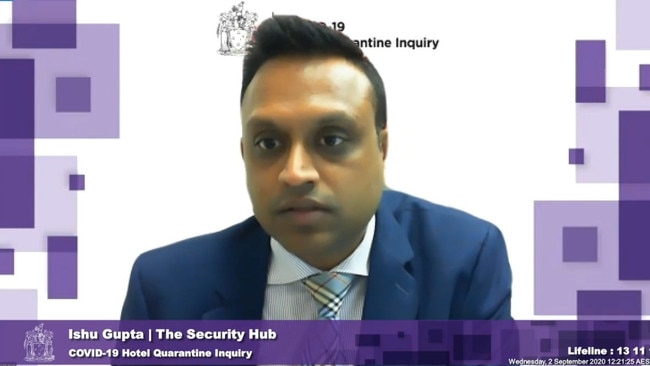
Evidence to the inquiry from a panel of security subcontractors also outlined concerns that guards were being asked to accompany guests on exercise breaks before the guest had been tested for COVID-19.
The subcontractors were hired by the three private security firms, Wilson Security, MSS Security and Unified Security, brought in by the Victorian government to oversee the hotel quarantine program for returning travellers.
Ishu Gupta, managing director of The Security Hub, told the inquiry the guards he arranged to put into the hotels were initially tasked with keeping the guests in their rooms.
“The job duties (were) just to make sure that nobody comes out, and if they do come out ask them politely to go back into the rooms and call the helpline set up by the (government),” Mr Gupta said.
READ the full story here
Rosie Lewis 3.13pm: State treasurers seize on GDP to justify border closures
The Queensland and Western Australian Labor treasurers have seized on the latest GDP figures to declare their respective border closures have helped prop up their states.
💯 @benwyatt.
— Cameron Dick (@camerondickqld) September 2, 2020
Stronger action on borders has QLD better placed for a strong economic recovery #UniteAndRecover https://t.co/H8Uwwnacq1
With WA’s economy shrinking by 6 per cent in the June quarter, the state’s treasurer Ben Wyatt said: “WA’s hard border is no drag on the national economy. Those states with strong borders faring the best in the June quarter economic figures. What is clear – control of the virus supports economic recovery.”
Queensland’s treasurer Cameron Dick, whose state recorded a 5.9 per cent reduction in state final demand, responded with “100 per cent” agreement.
“Stronger action on borders has Queensland better placed for a strong economic recovery,” Mr Dick said.
Their comments ignore the fact that mining investment lifted in the 2019-20 financial year for the first time since the mining investment boom, boosting the coffers of the resource-rich states.
Tasmania has also been shut off from the rest of the country for most of the pandemic but recorded a 7.4 per cent decline in demand in the June quarter, the third worst result behind the two biggest economies of NSW and Victoria.
The two best performing states or territories, the Australian Capital Territory and Northern Territory, have either never closed their borders or adopted restrictions targeting Australians in COVID-19 hotspots.
Queensland’s state election will be held on October 31 and WA heads to the polls next March.
READ MORE: Vaccines: what’s coming and when?
Rachel Baxendale 2.07pm: Virus numbers in Victorian health care workers grow
Victoria’s total number of cases in health workers since the pandemic began increased by 68 on Wednesday, to 3206, despite the number of active cases in health workers falling by 20, to 332.
Some of the increase between Tuesday and Wednesday may be due to cases from previous days being attributed to health workers.
The 332 active cases in health workers represent 13.7 per cent of the total 2415 active cases in the state, while 1177 active cases linked to aged care facilities represent 48.7 per cent of the state’s total number of active cases.
Victoria’s total number of coronavirus cases since the pandemic began rose by 86 on Wednesday, despite 90 new cases being recorded, due to the reclassification of four cases.
The total is now 19,224.
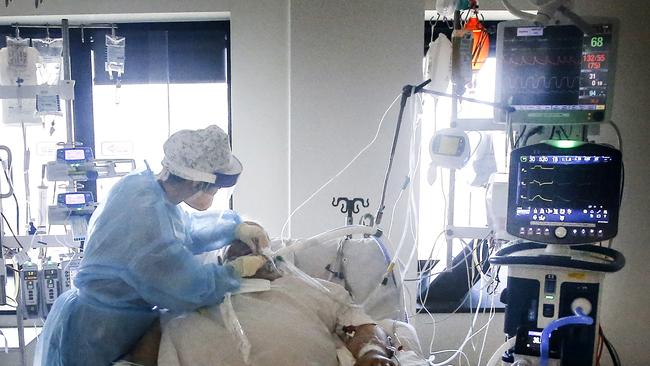
Of the 90 new cases, 22 have so far been linked to clusters, while the remaining 68 are under investigation.
There are 4351 cases for which contact tracers have been unable to establish a source of infection - an increase of 24 since Tuesday, and 235 in the past seven days.
There are 16,152 people who have recovered from the virus - an increase of 185 since Tuesday.
Of the 2415 cases currently active in Victoria, 2234 are in people from metropolitan Melbourne, 125 are from regional areas, 50 are from unknown addresses or subject to further investigation, and six are interstate residents.
Of the total 19,224 cases, 17,823 are in people from Melbourne and 1154 are in those from regional Victoria, while 9198 were in men (47.9 per cent) and 10,011 were in women (52.1 per cent).
There were 1177 active cases of coronavirus linked to aged care facilities in Victoria on Wednesday - up from 1197 on Tuesday - representing 48.7 per cent of the state’s 2415 active cases.
The worse clusters to date include:
214 cases linked to Epping Gardens Aged Care in Epping, in Melbourne’s north;
203 cases linked to St Basil’s Homes for the Aged in Fawkner, in Melbourne’s north;
197 cases linked to BaptCare Wyndham Lodge Community in Werribee, in Melbourne’s outer southwest (an increase of four since Tuesday);
161 cases linked to Estia Aged Care Facility in Ardeer, in Melbourne’s west;
139 cases linked to Kirkbrae Presbyterian Homes in Kilsyth, in Melbourne’s outer east;
127 cases linked to Twin Parks Aged Care in Reservoir, in Melbourne’s north (an increase of three since Tuesday);
123 cases linked to Cumberland Manor Aged Care Facility in Sunshine North, in Melbourne’s west;
116 cases linked to Japara Goonawarra Aged Care Facility in Sunbury, in Melbourne’s outer northwest (an increase of one since Tuesday);
115 cases linked to Outlook Gardens Aged Care Facility in Dandenong North, in Melbourne’s outer southeast;
114 cases linked to Estia Aged Care Facility in Heidelberg, in Melbourne’s northeast.
Other key outbreaks with new cases on Wednesday include:
72 cases linked to Peninsula Health Frankston, in Melbourne’s outer southeast (an increase of one since Tuesday);
45 cases have been linked to Vawdrey Australia Truck Manufacturer in Dandenong South, also in Melbourne’s outer southeast (an increase of one since Tuesday).
Victoria’s Department of Health and Human Services is also investigating cases linked to the following locations:
- Dandenong Police Station in Melbourne’s outer southeast;
- Kingston Centre community health in Heatherton, in Melbourne’s southeast;
- Doutta Galla Aged Services Woornack in Sunshine, in Melbourne’s west.
READ MORE: Trump denies series of strokes
Rachel Baxendale 2.57pm: Will Victorians still get grand final holiday?
The Andrews government has confirmed Victorians will still get a day off on the eve of the AFL grand final, even though the game will be played in Queensland, and many Melburnians will likely still be working from home.
Labor established the Friday before grand final day as a public holiday in its first year in government in 2015.
Now that the AFL Grand Final has been set for Saturday 24 October I can confirm that the public holiday will be on Friday 23 October.
— Jaala Pulford MP (@JaalaPulford) September 2, 2020
2020 is a tough year and this’ll be a chance to say thank you to Victorians for their effort and sacrifice to date.
Following the AFL’s confirmation on Wednesday that Melbourne has lost the 2020 grand final to Brisbane due to the state’s second wave of coronavirus infections, Employment and Small Business Minister Jaala Pulford said October 23 would still be a public holiday.
“Now that the AFL Grand Final has been set for Saturday 24 October I can confirm that the public holiday will be on Friday 23 October,” Ms Pulford tweeted.
“2020 is a tough year and this’ll be a chance to say thank you to Victorians for their effort and sacrifice to date.”
READ MORE: Nothing Marxist in Xi Jinping’s billionaire playground
Jade Gailberger 2.42pm: More than 23,000 Aussies stranded overseas
More than 23,000 Australians stuck overseas due to coronavirus border restrictions want to come home.
The number of Australians trying to return has soared in the past two weeks.
The Department of Foreign Affairs told a Senate inquiry investigating the implications of COVID-19 that at least 18,800 Australians had “indicated a wish to come home” on August 20.
But the department on Wednesday revealed that had now risen to about 23,000 people, with 7000 of those based in India.
DFAT spokeswoman Dr Fiona Webster told the committee about 15 per cent of travellers, or 3450 people, stuck overseas were classed as “vulnerable”.
More than $1.3 million in traveller emergency loans related to coronavirus were issued between March and June this year.
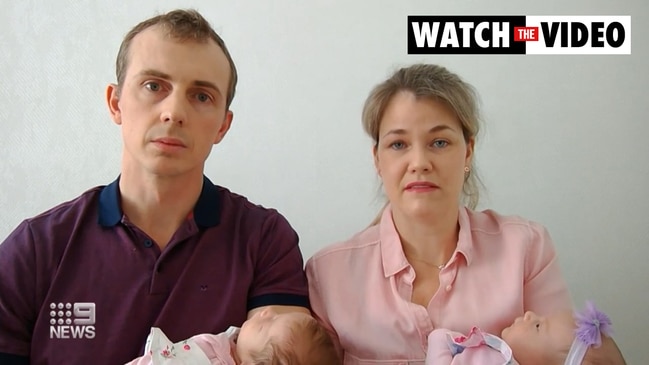
At least 402 loans have already been issued and available funds increased from $550,000 to $5 million.
There is no cap on the number of loans that can be issued to desperate traveller who have exhausted all financial options.
When asked if the $5 million would be allocated this year, Dr Webster said: “Yes, I do.”
The Federal Government’s 4000 weekly passenger cap has slashed the number of arrivals into the country and left airlines struggling to break even on scheduled flights.
This is forcing people to borrow money from family and friends to pay for a business class ticket in the hope they will be bumped up the waiting list for a seat.
The caps are being assessed at fortnightly National Cabinet meetings but are scheduled to remain until October 24.
Acting Immigration Minister Alan Tudge on Wednesday unveiled a new priority skills list, which allow small numbers of sponsored skilled workers to return to Australia to fill urgent skills needs in critical sectors.
Seventeen occupations on the list include nurses, GPs, psychiatrists, software and mechanical engineers and construction project managers.
“Our priority is getting Australians back into work, but we also need key health workers to help fight the virus and skilled migrants who are going to be job multipliers to help the economy recover,” Mr Tudge said.
Sponsored visa holders can request an exemption from Australia’s travel restrictions.
However, they will have to quarantine for 14 days at their own expense.
READ MORE: ASX rallies 2pc despite recession
Richard Ferguson 2.26pm: Liberal MPs back Abbott on borders
A number of government MPs are backing former prime minister Tony Abbott’s denunciation of border closures and long-term coronavirus restrictions.
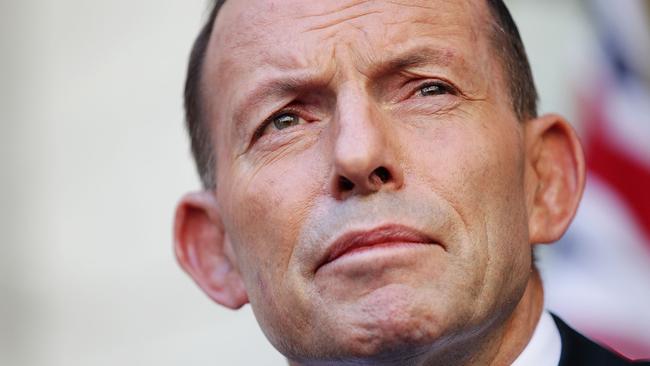
READ the full story here
Richard Ferguson 2.18pm: Labor out of touch on ‘most devastating day’
Scott Morrison has fought back calls to keep JobKeeper and JobSeeker at their current rates following the largest quarterly GDP fall in history, launching a spectacular attack on Labor.
Anthony Albanese asked the Prime Minister in question time how he could cut the rates of wage subsidies and welfare payments after the seven per cent contraction in the June quarter.
When Mr Morrison was welcomed with jeers and laughs from opposition MPs for saying he did not hesitate into introducing JobKeeper, he accused Labor of being out of touch.
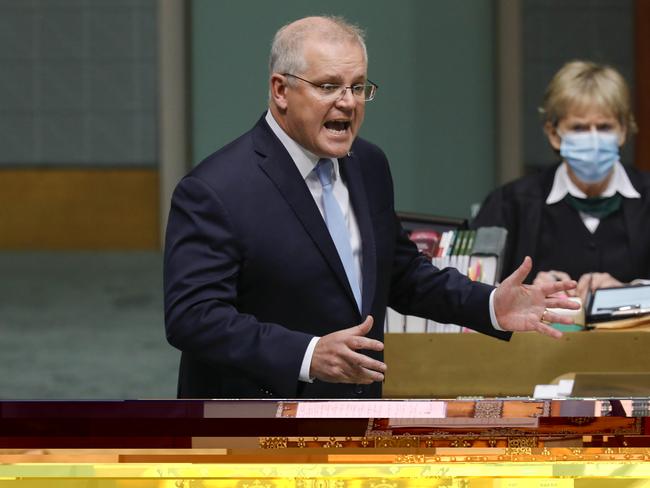
“I note the jeers and the laughter of those opposite on the most devastating day for Australia, Mr Speaker. And I note the politicking of those opposite, Mr Speaker, on this day. The only people who seem to be in a pleasant state of mind today, Mr Speaker, is the opposition,” he said.
Mr Morrison brought up old statements by the Opposition Leader on tapering JobKeeper, and he accused Mr Albanese of being more interested in parliamentary games.
“Each way bets of the Leader of the Opposition: he said JobKeeper should be extended but it should be transitioned. He said it should be higher and it should be lower,” he said.
“He is not someone who can be relied upon, Mr Speaker ... the Opposition Leader is not one you can trust in a crisis.
“He is not someone, despite his many years in this place where he considers himself the prince of the parliament ... he has spent more time taking points of orders than sat in a budget review committee.”
READ MORE: Australia Post blocks Holgate bonus
Richard Ferguson 2.07pm: Australians knew this day would come: PM
Scott Morrison has told question time the first official recession in 29 years is “devastating” and “savage”, but he is confident jobs and prosperity will return to Australia.
When asked by Anthony Albanese to confirm the nation had suffered its worst economic quarterly fall in recorded history, the Prime Minister said Australians had been expecting today’s figures.
“This is a devastating day for Australia ... Australians knew many, many months ago this day would come, and this day has come,” he told the House.
“And as harsh and as severe and heavy as this blow is on Australia today, Mr Speaker, we know that as a government that we have acted to seek to cushion that blow as much as we can and that has been done at a great cost and a price, Mr Speaker, worth paying.
“Australia will recover and Australia will grow again and the jobs will come back and they will support the lives and lives of Australians as they have in the past.
“And our plan for that to occur, Mr Speaker, that plan is built on the resilience and strength and the enterprise of the Australian people.”
Mr Morrison told the House that the government’s policies had prevented the loss of 700,000 extra jobs.
READ MORE: Musk supersizes giant SA battery
Adam Creighton 2.04pm: Weirdest recession we’ve ‘had to have’
If it’s the biggest recession we have ever had, it’s also the strangest: production collapsed, as expected, but we earned more.
We’re technically in a recession, but it won’t feel like one for many months yet.
Economic output as measured by GDP collapsed by 7 per cent between the March and June quarter – more than it ever has since quarterly records only go back to 1959 and probably ever.
In dollars, quarterly production – or output, if you prefer, being two sides of the same coin – was almost $35bn lower than in the December quarter, which was the last quarter before the economy began to shrink.
The previous biggest contraction was in 1974, when the economy shrank 2 per cent.
But it’s not the sheer size of the contraction that distinguishes it, it’s the extraordinary deluge of government support payments, which flooded the bank accounts of households and businesses like never before, more than making up for the slump in privately generated income.
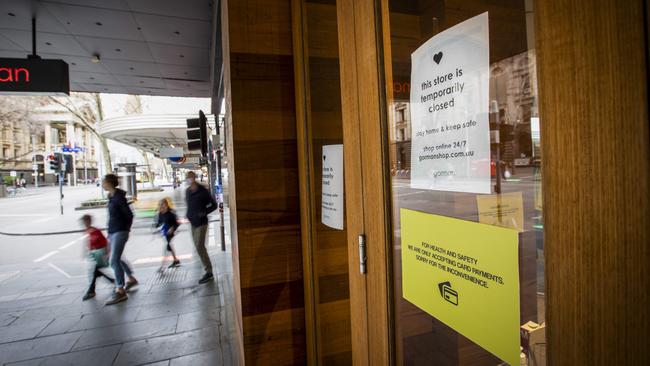
READ Adam Creighton’s full piece here
Courtney Walsh 1.52pm: AFL makes history with grand final call
The AFL has announced that the Gabba will host the 2020 grand final on October 24, and for the first time the match will be held at night.
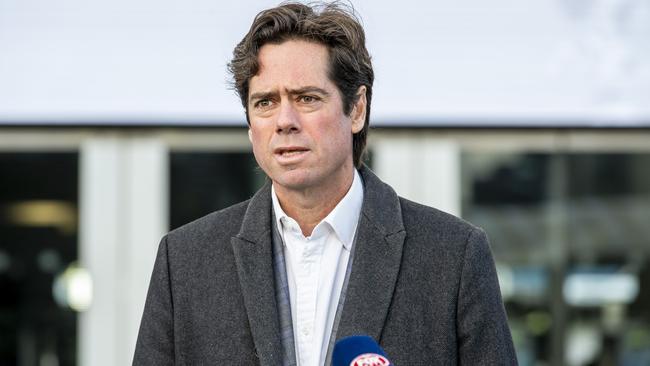
READ the full story here
Richard Ferguson 1.17pm: Victoria lockdown will bring worse economic result
Josh Frydenberg says the economy’s worst economic quarterly decline since World War II is devastating, but the June figures show Australia has emerged stronger from the COVID-19 pandemic than many other developed economies.
The Treasurer said in Canberra on Wednesday that the June National Accounts — including the seven per cent contraction in GDP in the last quarter — was full of “heartbreaking stories.”
‘Behind these numbers are heartbreaking stories of hardship, being filled by everyday Australians as they go about their daily lives,” he said.
“Be it the tourism operator in Cairns. The tradie in Melbourne. The cafe worker in Adelaide. The domestic flight attendant in Sydney. They have all been hit hard by COVID-19.
“Without the Morison government’s economic support — 700,000 more jobs would have been lost. And the unemployment rate would be five percentage points higher than it is today.
“This support has enabled Australia to avoid the fate of many other nations.”
Mr Frydenberg warned the road out of Australia’s first official recession in 29 years will be “long and bumpy” and the next economic quarter will be weighed down by Victoria’s second wave.
After revealing GDP had contracted by seven per cent in the June quarter — the worst economic decline in recorded Australian history — the Treasurer said the figures were better than the Treasury predicted in May, with economists fearing a 10 per cent quarterly fall.
Mr Frydenberg also said half of those left unemployed in June were back in work by July.
But while he struck an optimistic tone on the road to recovery, Mr Frydenberg said the “devastating” June figures did not include Melbourne’s level four lockdowns.
“The road ahead will be long, the road ahead will be hard, and the road ahead will be bumpy,” he said in Canberra.
“But it’s important to recognise that this fall in the June quarter does not include the economic impact from the stage for restrictions imposed by the Victorian government in early August.
“This is something that will weigh heavily on the September quarter numbers.”
READ MORE: Economy contracts 7pc in June quarter
Rosie Lewis 1.02pm: Health officers reject minister’s code for farmers
Australian’s chief health officers have rejected Agriculture Minister David Littleproud’s code giving farmers free movement across the country, following urgent calls for a set of national rules to let the agriculture industry keep working unimpeded by border closures.
The code was put to the Australian Health Protection Principal Committee, chaired by acting chief medical officer Paul Kelly, on Tuesday night but The Australian understands the states’ chief health officers failed to reach a consensus and endorse the proposal.
Under Mr Littleproud’s suggested code, obtained by The Australian, agriculture workers who crossed government-imposed state borders would be required to have a valid border permit, evidence of their identity and residence, evidence of their work being eligible under the code and a COVID-safe workplace plan.
When they are travelling, working or off duty, they must carry personal protective equipment when social distancing is not possible, including face masks, hand sanitiser and gloves.
They would also keep and retain records of their movements and contacts with other people, self-isolate where practicable and not work while symptomatic until a negative COVID-19 test result was received.
“The enforceable measures will be implemented in each state and territory where border controls are implemented, and compliance will be monitored in accordance with the relevant state or territory compliance regime to ensure ongoing industry and community confidence in arrangements for agriculture workers under the code,” it states.
“Penalties for breaching the enforceable measures in this code will be covered as breaches of the relevant state and territories’ public health order and/or emergency management directions for border crossings.”
The code would cover occupations critical to the agriculture industry, including all seasonal workers and temporary visa holders.
If a worker covered by the code was refused entry into a state, there would be an “appropriate” appeals process.
Federal government sources could not specify which states did not support the code but said some wanted to resubmit a watered-down version, which Mr Littleproud was against.
The code will still be proposed to Scott Morrison in its current form to take to national cabinet on Friday, meaning there could be multiple codes considered.
READ MORE: China’s fishermen are maritime mercenaries
Simon Benson 12.52pm: Numbers are bad news with more to come
Many Australians may not yet comprehend the scale of the economic crisis that has beset the country.
And today’s national account numbers revealing a seven per cent contraction in GDP between April and June are unlikely to deepen the national pessimism that already exists.
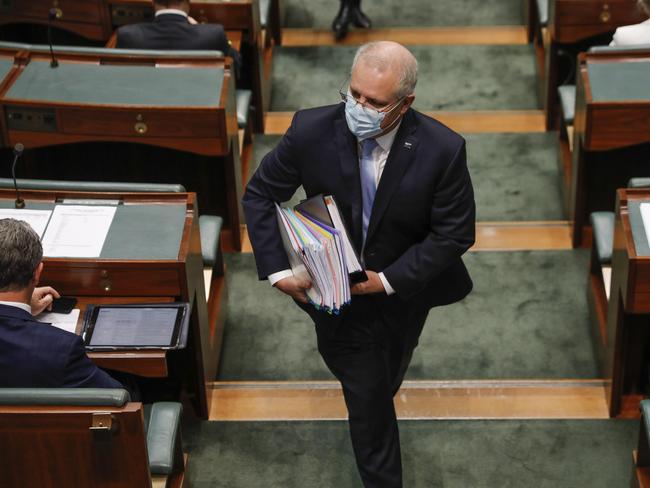
With billions of dollars going into keeping households afloat, the psychological impact could simply be absorbed as just more bad news, following months of other bad news.
And there’s plenty of more bad news to come.
This desensitising to “catastrophe messaging” presents yet another challenge, among the many, for the prime minister.
A research paper by Coalition pollsters bears out the difficult political contest ahead.
How to turn the dry economic argument toward “humanising the economic damage”.
The ability to do this has been a hallmark of Morrison’s leadership but has been lost recently to political arguments with the states over borders and doomsday politics.
READ Simon Benson’s full piece here
David Rogers 12.40pm: Pressure on RBA to announce more stimulus
While a record-breaking 7pc Q/Q drop in June quarter GDP wasn’t much larger than the RBA has anticipated, it will keep pressure on the Bank to announce more stimulus, according to Capital Economics senior economist Marcel Thieliant.
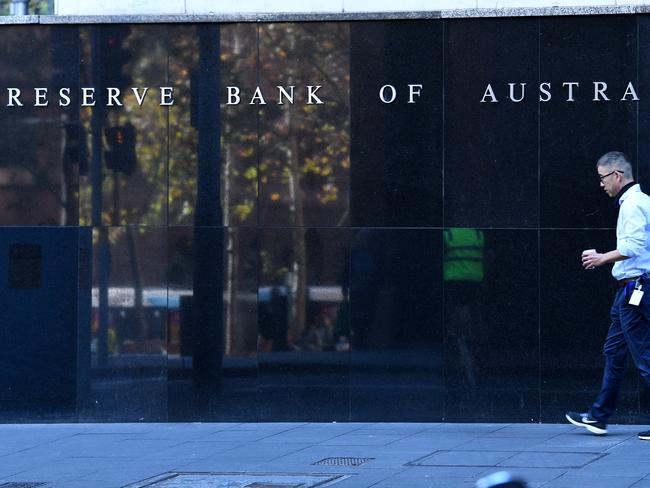
Key surprises were a 12.1pc Q/Q fall in consumption after a much deeper than expected 17.6pc q/q slump in services spending. He notes that with household disposable income rising by 2.2pc Q/Q in the wake of a record jump in social assistance benefits, the saving rate surged to 19.8pc, the highest it has been in almost half a century. A 4.9pc Q/Q drop in total investment was also much larger than we expected, with dwelling construction slumping and a further rise in mining investment not enough to prevent a drop in non-dwelling construction.
Looking ahead, he notes output will have fallen further in Victoria as restrictions on activity were tightened further in the wake of its second wave, but activity elsewhere will have rebounded. “We suspect that the rebound outside Victoria will be sufficient to generate a small 0.5pc Q/Q rise in the September quarter,” Mr Thieliant says.
READ MORE: Costello backs super rise rethink
Tom Dusevic 12.35pm: Cold bucket of reality: why a recession matters
Recessions remake nations, destroying and creating at will, changing lives, industries and the social fabric.
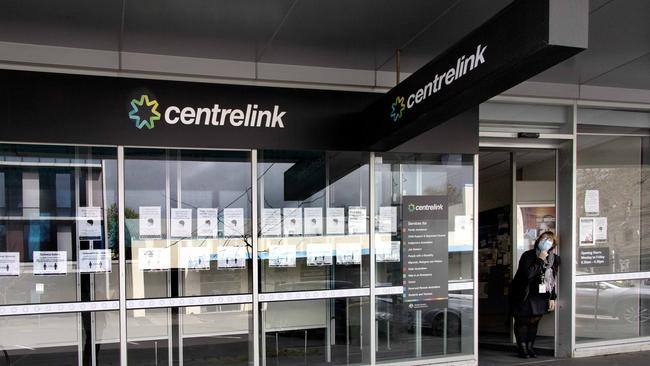
They can have long, nasty tails, flushing out the good and bad, but ultimately they are awful times of “disruption and economic distress” as a former Reserve Bank governor once put it.
The ongoing health crisis and its global nature mean we are mired in political and economic uncertainty.
Yet a 7 per cent fall in gross domestic product in the three months to June is a cold bucket of reality.
READ Tom Dusevic’s full piece here
Rachel Baxendale 12.27pm: Man’s ‘dropping off rice’ Covid breach excuse
A man who told police he had driven more than 14 km to “drop off rice” for his children, only to be found with $11,990 in cash and a quantity of drugs in his car, was among 129 people fined by Victoria Police for breaching coronavirus restrictions in the 24 hours to Wednesday.
The man had driven to the COVID-19 hotspot of Broadmeadows, in Melbourne’s north, from Sunshine North, in the city’s coronavirus-riddled west.
Others fined included a woman who told police she was out in Southbank during curfew to buy cigarettes.
Among those fined were 18 people who received $200 fines for failing to wear a face covering, many of whom claimed to have left their masks at home.
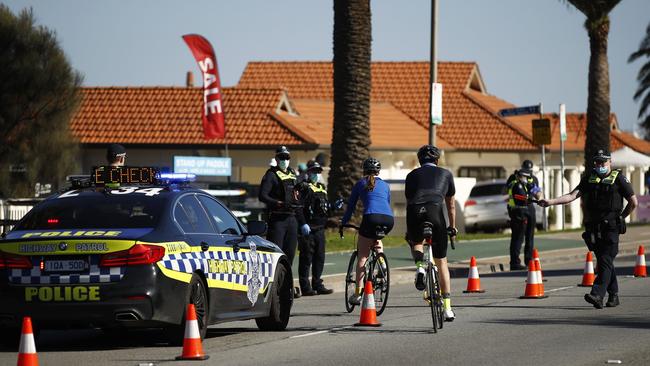
There were 10 fines issued at vehicle checkpoints, where 17,116 vehicles were checked in the 24 hours to Wednesday.
There were 64 fines issued for breaches of Melbourne’s Stage Four 8pm to 5am curfew.
Home visits for purposes other than work or essential caregiving purposes have been banned in Melbourne since all metropolitan LGAs went into Stage Three restrictions on July 9.
The same restrictions have applied in all of regional Victoria since August 2 - the same day Melbourne went into Stage Four, with all exercise and shopping limited to within a 5km radius of people’s homes, and work and medical care otherwise the only legitimate reasons for leaving home.
Police conducted 5598 spot checks on people at homes, businesses and public places in the 24 hours to Wednesday, adding to a total of 369,185 spot checks conducted since 21 March.
READ MORE: Petrol prices hit 21-year low
Patrick Commins 11.30am: Economy contracts 7pc in June Quarter
Australia’s economy contracted by 7 per cent during the June quarter, confirming the nation’s first recession since the early 1990s as the COVID-19 crisis dealt the country its most severe economic blow since World War II.
Over the year to June the economy shrank by 6.3 per cent, the seasonally adjusted figures from the Australian Bureau of Statistics revealed. Real GDP dropped by 0.3 per cent in the March quarter, making it two consecutive quarters of contraction — the technical, if rather limited, definition of a recession.
“This is, by a wide margin, the largest fall in quarterly GDP since records began in 1959,” ABS head of national accounts Michael Smedes said
Private demand detracted a massive 7.9 percentage points from GDP, driven by a 12.1 per cent fall in household final consumption expenditure, the ABS said, as social distancing measures restricted peoples’ movements and shuttered many businesses.
Spending by households on discretionary items slumped by 25 per cent, the figures showed.
Spending on services fell 17.6 per cent, with falls in transport services, and in hotels, cafes and restaurants.
While the economy tanked 7%, household income actually ROSE 2.2% during the second quarter, suggesting we might have gone a little overboard on stimulus.
— Adam Creighton (@Adam_Creighton) September 2, 2020
And unincorporated businesses enjoyed a 22% earnings bump! pic.twitter.com/CzwX0coqRr
Net trade contributed 1 percentage points to GDP, as the pandemic smashed imports more than exports – the latter supported by a solid lift in iron ore exports.
Government spending contributed 0.6 percentage points to GDP, which the ABS said was driven by health-related spending by state and local governments.
In contrast, during the last recession at the start of the 1990s, real GDP fell by 1.3 per cent in the December quarter of 1991, followed by a 0.1 dip in the March quarter of the following year.
A decade before, the recession of the early 1980s saw four consecutive quarters of negative growth, peaking at -1.6 per cent in the three months to December 1982.
The 7 per cent contraction in the June quarter was the biggest fall in
The national accounts figures come a day after the government passed its JobKeeper extension legislation, where the $1500 a fortnight wage subsidy payment will be cut to $1200 from the end of September for eligible employers. At the same time, the $550 a fortnight JobSeeker coronavirus supplement will be reduced to $250.
READ MORE: Trading Day — ASX up 1.5pc as GDP drops
Rachel Baxendale 11.12am: All today’s Victorian deaths linked to aged care
Victoria’s 90 new coronavirus cases in the 24 hours to Wednesday have brought the total since the pandemic began to 19,224.
Of six deaths recorded in the 24 hours to Wednesday, three occurred in the period, and three occurred earlier but have now been added to the COVID-19 tally, bringing Victoria’s COVID-19 death toll to 576.
The deaths include those of five men in their 80s and one man in his 90s.
All were linked to aged care facilities.
There were 406 people in Victorian hospitals with coronavirus on Wednesday, including 18 in intensive care, of whom 13 were on ventilators.
This compares with 421 in hospital on Tuesday, including 20 in intensive care, of whom seven were on ventilators.
Victoria’s 90 new cases on Wednesday come after 13,912 tests were processed in the preceding 24 hours, resulting in a positive test rate of 0.65 per cent - down very slightly from Tuesday’s 0.69 per cent, but up from a low of 0.44 per cent last Thursday.
The record was 3.73 per cent from 671 cases and 18,000 tests on August 2.
The 13,912 tests are an improvement on Tuesday’s 10,153 - the lowest daily number of tests processed in more than two months - but well down from an August average of more than 20,000 tests processed each day, peaking at 41,416 tests processed on August 9.
There have been 2,248,952 tests processed in Victoria since the pandemic began.
There are now 2145 active cases of coronavirus in Victoria - a decrease of 104 since Tuesday and down from the peak of 7880 active cases on August 11.
There have now been 4351 cases for which contact tracers have been unable to establish a source of infection in Victoria since the pandemic began.
This does not include new cases which remain under investigation.
The number of active cases in regional Victoria fell to 125 on Wednesday, down from 139 on Tuesday and a peak of 512.
Greater Geelong is now the regional Victorian LGA with the highest number of active cases at 40 - down from 50 on Tuesday.
There are 332 active cases in Victorian healthcare workers, down from 352 on Tuesday.
There are 1177 active cases linked to 97 aged care facilities, down from 1197 active cases on Tuesday.
The number of active cases linked to residential disability accommodation fell to 35, down from 42 on Tuesday.
This includes 23 cases in staff and 12 in residents
READ MORE: PVO — An economic disaster of epic proportions
Imogen Reid 11.09am: NSW records 17 new cases as Sydney cluster grows
NSW has recorded 17 new coronavirus infections in the past 24 hours.
Of those cases, one is a returned overseas traveller in hotel quarantine and the remainder are all linked to known cases or clusters.
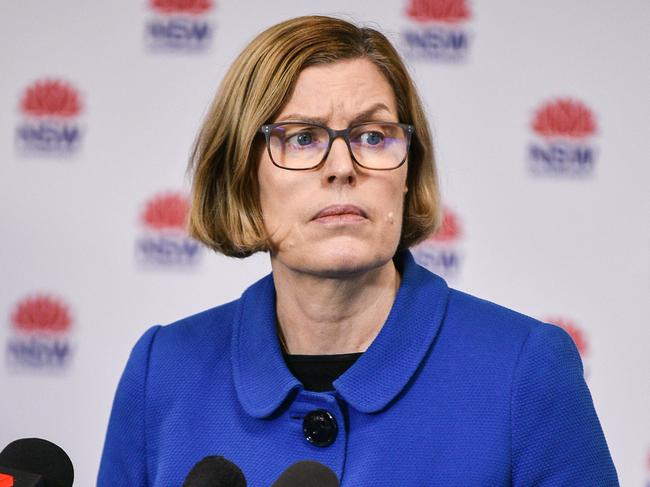
NSW Chief Health Officer Kerry Chant confirmed that of today’s 17 new cases one was locally acquired with no known source, one was a returned traveller in hotel quarantine, 15 were linked to known clusters, eight were linked to the CBD cluster, six to the St Paul’s Catholic College Greystanes outbreak and one to Liverpool Hospital.
The CBD cluster is now associated with 49 cases.
Dr Chant said one previously reported case who worked at the Cubbyhouse Childcare out-of-school-hours centre at Homebush Public School has been excluded from the tally following further investigations.
“People previously identified as close contacts are no longer required to isolate for 14 days and we thank those members of the community who assisted us there,” she said.
Two more students and four contacts from St Paul’s Catholic College have tested positive for the virus, taking the total number of associated cases to 10.
“That equates to six children and four household members associated with that cluster of 10,” Dr Chant said.
“The school has been cleaned and remains closed to onsite learning today, and as I indicated the source of that infection is under investigation.”
Dr Chant said the case reported yesterday from Girraween Public School has links to the St Paul’s Catholic School cluster.
NSW Health has issued several fresh alerts to venues across the state.
Anyone who attended the Four in Hand Pub in Paddington downstairs or was at the venue for more than two hours is considered a close contact and must get tested and self-isolate for 14 days.
Anyone who dined upstairs or was at the pub for less than two hours are considered to be casual contacts and have been directed to watch for symptoms.
People who attended the follow sites are considered casual contacts and are being urged to be vigilant and to seek testing should they experience any symptoms of COVID-19:
- Metro Fuel Greystanes on August 27 from 3.15 to 3.35pm
- The Big Bun restaurant in Merrylands on August 27 from 3.30 to 4pm
- The toilets in the Carslaw Building at the University of Sydney on August 28 at 8pm-8.20pm
- Stocklands at Merrylands on August 29 between 9am and 11am
- Bus 810 on August 28 departed St Paul’s Catholic College Greystanes at 3.04pm and arrived at 3.28pm at Macquarie Road Greystanes.
“As the Premier indicated, we continue to urge the community to do their hard work and come forward for testing,” Dr Chant said.
“There is no more critical stage in our response than currently as we try to mop up the cluster associated with the CBD. We have seen that that cluster has spread far and wide, as you would expect because a number of people journey into the CBD each day. We thank all those individuals coming forward for testing each day, that’s allowed us to break a number of chains of transmission”
Dennis Shanahan 10.58am: From recession to ‘what’s next?’
Scott Morrison and Josh Frydenberg are presiding over the biggest economic collapse in more than 75 years, and yet they are not being punished politically and even ride high on public support.
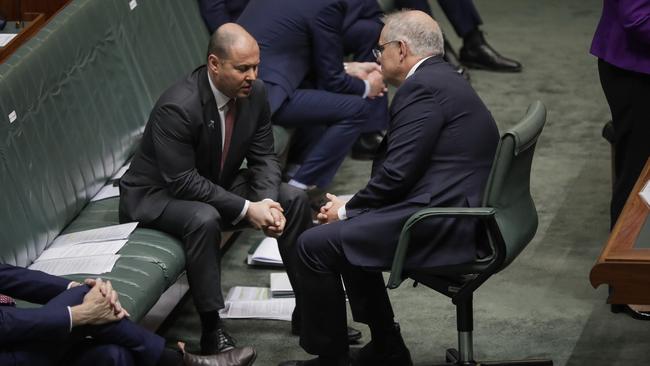
It’s because the official recession we now have is not the “recession we had to have” but the “COVID-19 recession”; the result of a global downturn, which in turn is the result of a global pandemic.
Instead of the immediate political and economic debate being about the dire “eye-watering” debt, deficits, job losses, spending and collapse of GDP, the pressure point is about the future.
READ Dennis Shanahan’s full piece here
Rachel Baxendale 10.33am: Victorian Labor ‘used tactics to gag debate’
Victorian opposition leader in the upper house David Davis said the state of emergency extension was a “grab for power” by Premier Daniel Andrews, accusing Labor of using tactics to gag debate.
“We’ve never supported those tactics. We’ve never agreed with gagging debate on key clauses, and there is an irony, when Daniel Andrews is grabbing power in this way, that he’s used this power to silence debate and silence the scrutiny and accountability that should be there,” Mr Davis said.
“The fact is that this bill will give more power to the health bureaucrats and to Daniel Andrews, much more power, and the fact is that this is not the best outcome for Victorians.
“Victorians wanted to see proper checks, proper balances, proper controls in place so that those powers, month to month, would be employed in a way that was properly accountable to the parliament, and ultimately to the people.”
Mr Davis said the upper house had not previously had a tradition of “guillotines and gags”.
“When I was leader of the government of the upper house, we never used it, never once,” he said.
“We had a majority, but we allowed debate to occur, sometimes long debates, and sometimes they’re inconvenient. Democracy sometimes is.
“Sometimes there’s questions that you wish weren’t asked, and sometimes there’s things that are uncomfortable. So be it. That’s what democracy is about.
“It’s about proper scrutiny and proper accountability, and the truth is, the government in a shabby decision, should not have used the gag to close down debate on a piece of legislation that itself was a grab for power.”
Asked to respond to crossbencher Andy Meddick’s claim that the opposition had prolonged debate by “grandstanding”, Mr Davis said it was reasonable to expect every Coalition MP to speak and engage in “robust debate”.
“A significant question is how many government members spoke?” he said.
“Massive legislation going through, massive curtailment of liberties, massive power for the Premier. Very few government members spoke. Do they have not views? Why is that?”
READ MORE: Paul Kelly — Trump vs Biden on what constitutes virtue
Rachel Baxendale 10.19am: Andrews to address media at 11am
Victorian Premier Daniel Andrews is due to address the media at 11am.
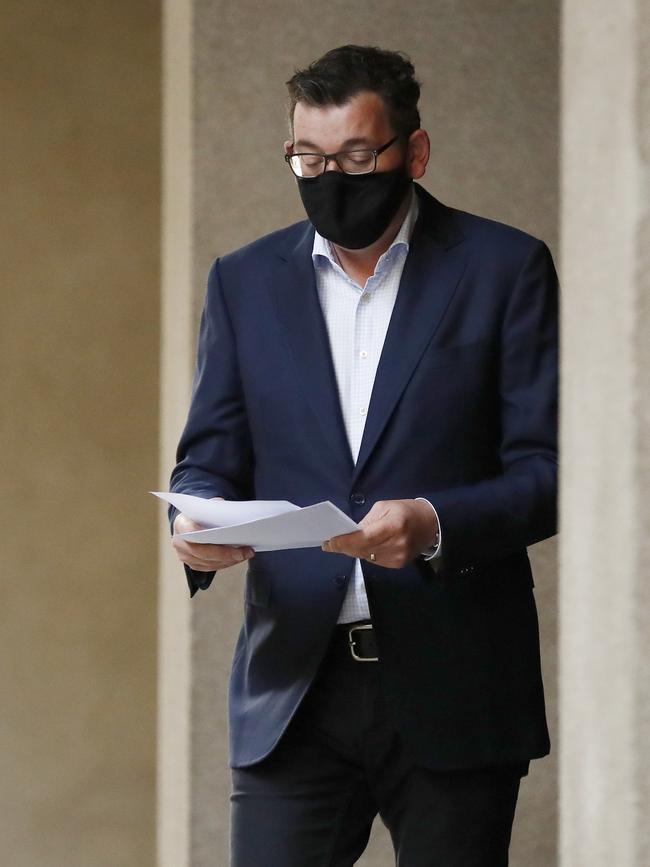
The press conference comes as Victoria recorded 90 new cases of coronavirus and six deaths in the 24 hours to Wednesday.
The 90 cases are higher than a two month low of 70 cases on Tuesday and 73 on Monday, but the overall trend is continuing down, with the seven day daily average falling to 95 — the first time it has been below 100 since July 6, almost two months ago.
READ MORE: Funding promise on unis ‘fails to deliver’
Charlie Peel 10.06am: Berejilklian: My pleas to Palaszczuk fall on deaf ears
Annastacia Palaszczuk does not have a working relationship with Gladys Berejiklian over the border dividing their respective states, the NSW premier has said.
Speaking on 2GB’s Ben Fordham Live on Wednesday morning, Ms Berejiklian took another swipe at her Queensland counterpart and said her relationship with Victorian Premier Daniel Andrews and Prime Minister Scott Morrison was better than that with Ms Palaszczuk.
Ms Berejiklian said Ms Palaszczuk would not engage with her on making decisions about border closures and was “refusing to budge” on her border closure decision.
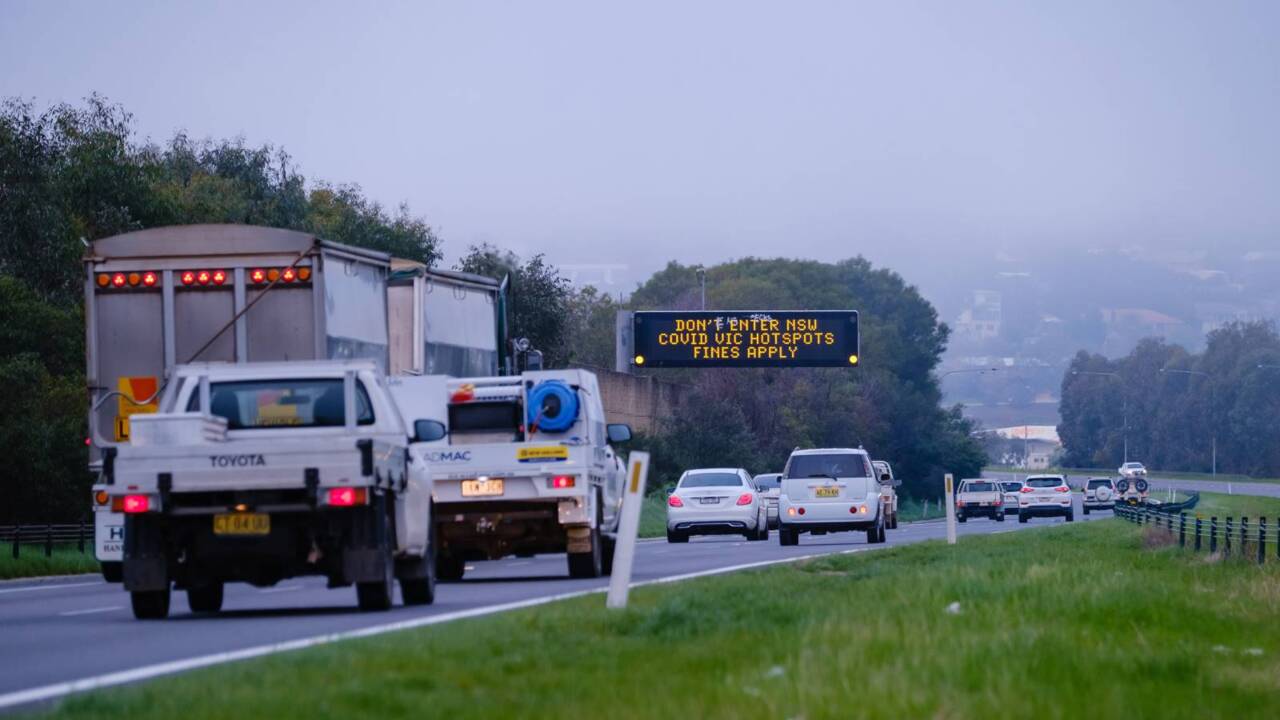
“It’s not through want of trying,” she said.
“I’ve tried to establish a positive relationship, but it’s a bit difficult when decisions are made without even telling us,” Ms Berejiklian said.
“Can I compare that to Dan Andrews and the Prime Minister? The three of us worked together on a very difficult decision about the Victorian and NSW border, and I would like to see that applied to all borders.
“I think that at this stage of the pandemic all of us should be thinking about how we can make life easier for our citizens, what they can do rather than what they can’t do and that is the headspace we are in NSW.”
Ms Berejiklian suggested border closures, which have been politically popular, were about politics and urged her counterparts in other states to be compassionate when dealing with issues that have affected people’s lives and kept family members apart.
“I would just ask for all premiers to exhibit compassion during this time,” Ms Berejiklian said.
“This is not about politics … this is about people’s lives.”
Asked about Ms Berejiklian’s comments, Ms Palaszczuk said: “I don’t have any issues with working with any of my colleagues around the country, in fact we all have very good working relationships.”
— With Imogen Reid
READ MORE: Kirby — A new problem for property investors
Robert Gottliebsen 10.00am: Is there still room for respect with China?
Australia has a stark choice. The detention of high-profile Australian journalist Cheng Lei sends a clear message that Australia-China relationships are in danger of becoming much worse. Not only is the safety of Australians in China now jeopardised, but we are about so see severe damage to industries like wine, beef, grain farming, universities and tourism. We will simply not generate the community wealth to recover from the COVID-19 outlays.
But at almost exactly the same time as Cheng was being detained, China sent an olive branch to Australia. If Australians want to repair the relationship with China, the Middle Kingdom has shown us how to do it.
So today I want to simply describe the Chinese offer, mindful that we are dealing with a very different and tougher China to the nation of five years ago.
READ Robert Gottliebsen’s full piece here
Jared Lynch 9.57am: ‘White trash sending us their weeds’
China has fired a new salvo in the worsening trade war with Australia, banning some barley imports over what were reported as “harmful weeds” in the grain.
China suspended imports from Australia’s biggest barley exporter, Perth-headquartered CBH Group, as trade tensions continue to escalate between Beijing and Canberra.
CBH is the second Australian agribusiness targeted in four days after the communist regime banned imports from a Queensland abattoir in Agriculture Minister David Littleproud’s electorate, saying Chinese customs had detected a drug used to treat eye infections in dogs and cats in the beef.
CBH Group claims to be the largest farming co-operative, owned and controlled by 3900 Western Australian grain growers. In the past five years, China has bought 60 to 70 per cent of Australian-grown barley.
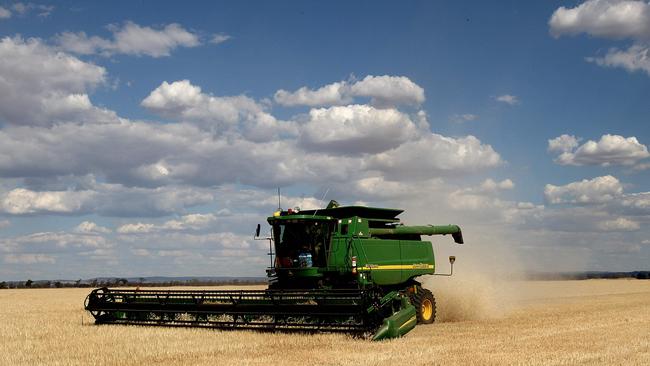
The bans follow Scott Morrison’s announcement on Thursday he would legislate to tear up Victoria’s multi-million-dollar Belt and Road Initiative agreement with Beijing and other agreements found to be against the national interest.
Diplomatic tensions have simmered for months after the Prime Minister spearheaded a push for an inquiry into the origins of the coronavirus, which spread from the Chinese city of Wuhan to the rest of the world from January.
China’s The Global Times newspaper, ran several pieces attacking Australia on Tuesday.
In one negative article, it invoked former Singaporean prime minister Lee Kuan Yew’s 1980s gibe that unless Australia opened its economy and lowered unemployment, it risked becoming “the poor white trash of Asia’’.
READ the full story here
Rachel Baxendale 9.13am: How the crossbenchers voted on emergency bill
Victorian Animal Justice Party MP Andy Meddick has welcomed the state upper house’s passage of the Andrews government’s State of Emergency extension bill in the early hours of Wednesday morning, defending his record as the crossbencher who most frequently votes with Labor.
The government was forced to amend the bill from a 12-month extension to six months, after it became clear Mr Meddick was the only crossbencher prepared to support 12 months.
The bill passed shortly after 2am on Wednesday morning following a marathon debate.
The 40 member upper house split 20-19 in favour of the bill, with disgraced Labor powerbroker Adem Somyurek, who now sits on the crossbench, opting to abstain.
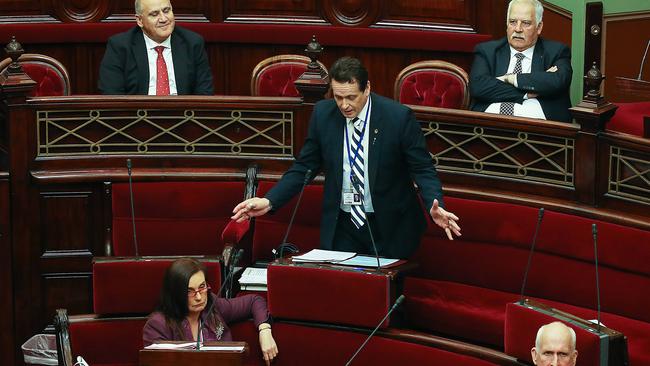
Mr Meddick was joined by fellow crossbenchers Reason Party leader Fiona Patten and Greens leader Samantha Ratnam, who returned from maternity leave at the last minute to support the government bill.
The remaining eight members of the crossbench joined with the 11 Coalition MPs to oppose the bill.
Mr Meddick said it was “no surprise” that he frequently voted with the government, given he comes “from the left wing of politics to begin with”.
“I look at every single piece of legislation on its merits, but I’m a trade unionist, I’ve been in a trade union, the CFMEU, for 20 odd years,” he said.
“On several occasions I’ve voted against amendments to the government ... if I didn’t think they did the right thing by Victorians, and I’m certainly not happy with the way that the government treats our animals that we share the planet with in many areas, and I continue to push that, and the clear evidence of that as my continual bringing up with the issue of recreational duck shooting in Victoria.”
Mr Meddick blamed the Coalition for the late sitting, arguing they should not have debated amendments they knew would be defeated.
“Convention states that when an amendment is brought and it’s a test for other amendments then those further amendments are not debated, you know, they’ve been tested, they’ve been tried and they’ve been defeated, but the the opposition decided to throw that convention out the window, and to bring each of those amendments again individually,” Mr Meddick said.
He said the passage of the bill would bring “certainty” for Victorians.
“Now they’re surety that come Sunday, that they will hear the roadmap from the Premier, and I’m very, very interested to see how that looks for regional Victoria, because certainly I believe the settings for regional Victoria should be different,” the Member for Western Victoria said.
“There are far lower numbers of infection, far lower numbers of daily rates out there, and, you know, we need to open up the inter-regional travel.
“Someone from Warrnambool, for instance, should be able to go and spend their tourist dollars in the Grampians. Someone from the Grampians might want to go to Swan Hill, and provided that that fits into the chief Health Officer’s advice, then I think that regional Victoria might well be able to look forward to opening up a little.”
Mr Meddick said he had not done any deals with the government.
“Absolutely not. I unequivocally said that this was far too important for the safety of Victorians to blackmail a government or to ask for anything in return.”
READ MORE: Editorial — Andrews set for power grab as Covid cases fall
Erin Lyons 8.49am: Victoria’s emergency powers slammed
The bill to extend state of emergency powers in Victoria for six months passed the upper house following a marathon debate that trickled into the early hours of Wednesday morning.
Upper House Opposition leader David Davis has come out this morning slamming the decision, claiming the debate was “gagged” and the final outcome “a dagger in the heart of democracy”.
The bill to extend the emergency powers in Victoria for six months passed at 2am following a marathon debate.
The vote went down to the wire with 20 MPs voting in favour and 19 against.
The extension gives chief health officer Brett Sutton the power to extend and impose COVID-19 restrictions, such as a curfew and mandatory mask wearing in public, for another six months.
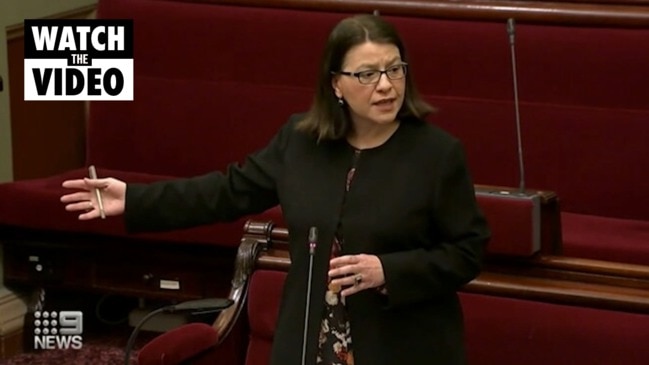
But Mr Davis demanded answers on why Labor MPs voted to stop questions being asked on the crucial legislation.
“The Andrews Government described the bill as the most important to be debated this parliamentary term, yet time and time again, Labor voted to prevent important questions from being asked,” he said.
“It was a shameful, arrogant and undemocratic display that Victorians have been accustomed to from Victorian Labor and Daniel Andrews.
“Victorians have concerns they wanted addressed in state parliament. Sole traders are suffering, self-harm in students has risen dramatically, families are being locked inside their homes, multicultural communities have been ignored and businesses may never open again. Yet, Daniel Andrews and Labor shamefully turned their back on all Victorians.”
The bill still needs to pass the lower house when it next sits on Thursday, but it is expected to sail through due to the Andrews government’s large majority.
The Victorian government faced fierce backlash over its initial plan of a 12-month extension to the state of emergency.
The Opposition were unsuccessful in their attempt amend the bill to have the state of emergency powers extended month to month.
Health Minister Jenny Mikakos was heckled repeatedly throughout her speech and told parliament those who voted against the bill were essentially voting for a “third wave”. —NCA Newswire
Sarah Elks 8.35am: Grand final ‘once-in-a-lifetime opportunity’
Queensland Premier Annastacia Palaszczuk says hosting the AFL grandfinal in Brisbane would be “a once-in-a-lifetime opportunity”.
Ms Palaszczuk said, if Queensland won the event, the state would “safeguard it for a year” for Victoria.
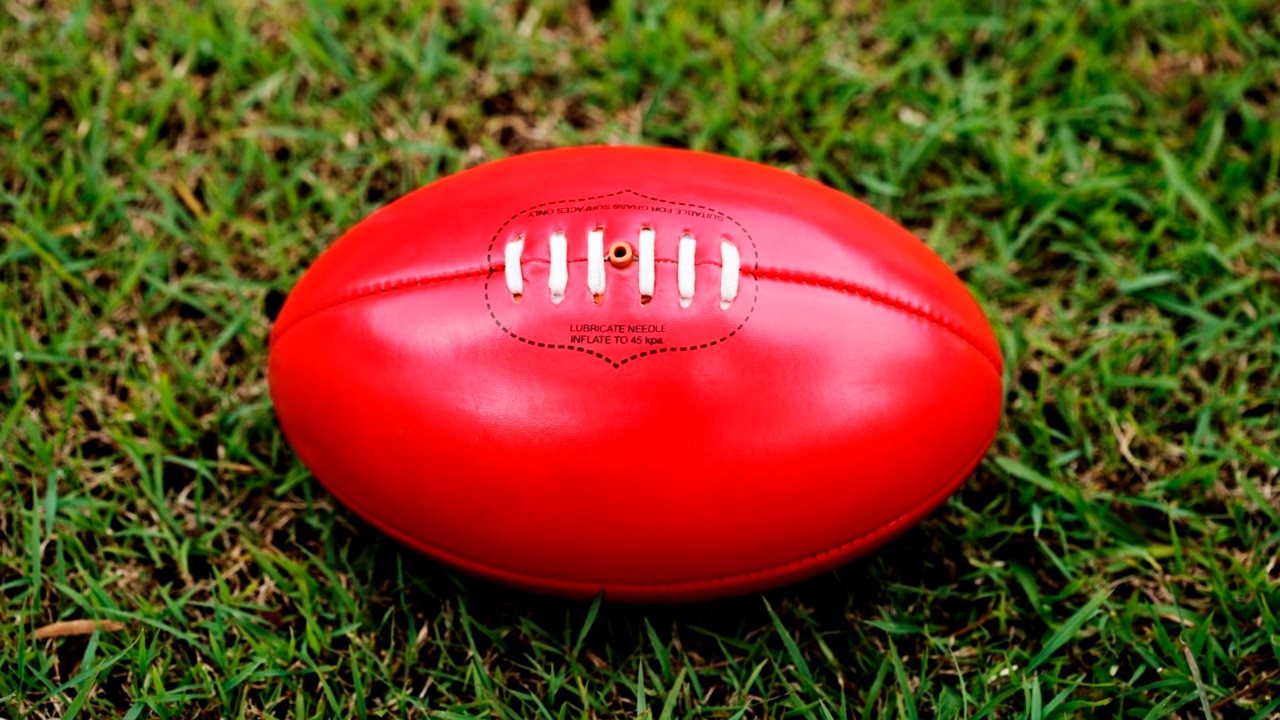
The Premier defended dozens of AFL players and their families coming to Brisbane from Melbourne, across the state’s closed borders, saying the industry had a locked-in COVIDsafe plan.
The state recorded two new cases of coronavirus overnight, and Ms Palaszczuk said the south-east outbreak linked to the Brisbane Youth Detention Centre and the corrections training centre had been contained.
Queensland records two new cases
Queensland’s two new cases are linked with existing known cases, which Ms Palaszczuk said authorities were “very comfortable” with.
The state now has 28 active cases, of 1126 total coronavirus cases since the pandemic began.
In the past 24 hours, 18,151 tests have been conducted.
READ MORE: AFL family heads north for historic day
Rachel Baxendale 8.34am: Victoria records 90 new cases, six deaths
Victoria has recorded 90 new cases of coronavirus in the 24 hours to Wednesday, and six deaths.
The 90 new cases compare with a more than two month low of 70 on Tuesday, and 73 on Monday.
#COVID19VicData for 2 September, 2020:
— VicGovDHHS (@VicGovDHHS) September 1, 2020
There were 90 cases and sadly 6 deaths reported yesterday in Victoria. Our condolences to all affected. More information will be available later today via our media release. pic.twitter.com/pJONuMg8SW
However, the new number has brought the seven day daily average number of new cases down to 95 - the first time it has fallen below 100 since July 6 - almost two months ago.
The six deaths bring Victoria’s coronavirus death toll to 576.
Imogen Reid 8.05am: We stand by our pandemic response: Cormann
Finance Minister Mathias Cormann has told Australians to brace for a severe contraction, as he stood by the decisions the federal government made in its response to the COVID-19 pandemic, claiming their first priority was saving Australian lives.
Addressing the media just hours before the release of the June quarter national accounts confirming Australia is officially in recession for the first time in three decades, Mr Cormann said the restrictions placed on the country’s economy were a necessary part of controlling the spread of the virus.
“I’m not going to predict the figures ahead of the release this morning, but we do need to expect a severe contraction and we know what has caused it – economies around the world have been hit very hard by the impact of the coronavirus pandemic,” he told Sunrise this morning.
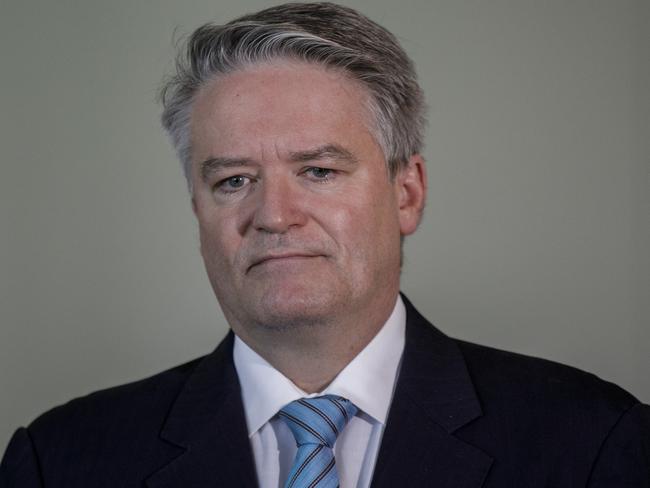
“We were hit by an unexpected crisis which came out of nowhere and clearly the first priority was to protect people’s health and save people’s lives by suppressing the spread of the virus and that was absolutely necessary,” Mr Cormann said.
“Part of that, we did have to impose significant restrictions on the economy in order to suppress the spread of the virus that was appropriate. What is true, once you stabilise the situation, of course we need to bring revenue in when we can, but to find a pathway out of this into the new normal to ensure that we can maximise economic activity and the strength of the recovery in a way that’s COVID-safe.
“We stand by the decisions we made to protect people’s health and save lives and we’re also committed to protecting people’s livelihoods and to maximise the strength of the economy on the other side and that is why we need to have a system in place to minimise, to the greatest extent possible, the risk of further outbreaks.”
Opposition treasury spokesman Jim Chalmers on Wednesday said it was going to be “a dark day”.
“This will be the worst quartlerly GDP since these records were first kept,” he told ABC RN.
READ MORE: RBA’s $110bn lifeline to banks
Imogen Reid 7.40am: McKenzie slams ‘city centric’ premiers over borders
The leader of the Nationals in the Senate has slammed “city-centric” state governments for ignoring the needs of regional and rural parts of Australia after appealing to state leaders to agree to a hotspot approach to coronavirus outbreaks over hard border closures.
Senator Bridget McKenzie said the border restrictions had only served to highlight the disconnect that still existed between the city and the country.
“Many of the cases my office and that of my colleagues have been helping are absolutely heartbreaking, all of which were avoidable if our state governments had of shut down and isolated COVID hotspots rather than an entire region,” she said in a statement.
Senator McKenzie urged Premiers to use “common-sense and use evidence over politics at this Friday’s National Cabinet so there’s an agreed definition of COVID hotspots and in determining where they are.
“We know how contagious this virus is from the start. We need to treat isolated outbreaks no matter where they are, in isolation, shut that region or area down very swiftly and securely and let the rest of our community, our state, our regions get on with doing business,” she told 2GB.
“I’d be calling on the premiers to stop playing populist politics and to actually recognise that we need to open up… where there is no medical risk.
“Lives and livelihoods are being devastated due to these decisions by state premiers.”
From Friday, new permits will allow holders to travel 50 kilometres either side of the NSW-Victoria border for school, work and to access and obtain services and goods.
READ MORE: ‘Worse to come’ in home price downturn
Imogen Reid 7.15am: Calls to cancel Sydney NY Eve fireworks
Sydney’s New Year’s Eve celebrations could be cancelled amid concerns it would be irresponsible to encourage hoards of people to the harbour’s foreshore for health and safety reasons.
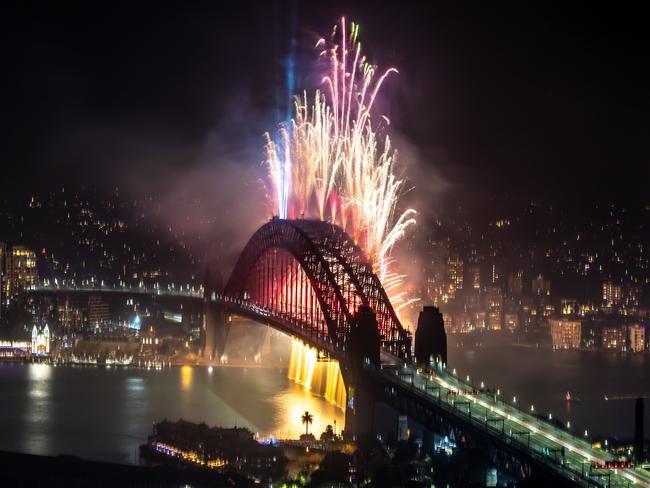
NSW Deputy Premier John Barilaro told Nine’s Today show if regions like Tamworth had been forced to cancel their major events, then Sydney’s famous celebration would not be permitted to go ahead.
“I don’t want to see it happen but the reality is, how can you attract 1 million people to the harbour shores and do it in a safe way? We know it won’t happen,” Mr Barilaro said.
“We have seen what is happening in Victoria, the impact it will have on our resources, on the community. The risk is far too high.
“It is better flagging this early. I’m in Tamworth. The Country Music Festival has been cancelled until next January. This is the reality of the pandemic.”
READ MORE: Firms keep tabs on vaccine side effects
Imogen Reid 6.45am: Global deaths begin to fall
Russia’s coronavirus case tally has exceeded 1 million as schools reopened across the country.
Russia has the fourth highest tally in the world after the United States, Brazil and India.
It is now mandatory for teachers to wear masks in schools in Moscow, after 4729 new infections and 123 deaths had been confirmed in the last 24 hours.
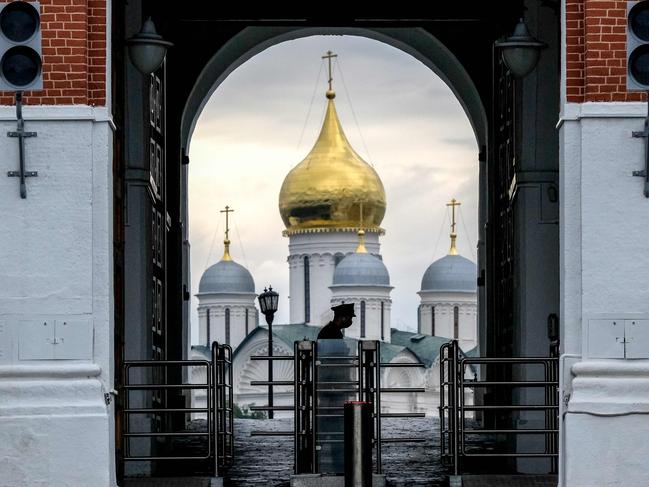
India has led the global rise in new weekly cases with nearly half a million fresh infections, pushing the world’s tally up by one per cent. The total number of new infections rose by 1.8 million. Global new deaths in the past seven days fell by 3 per cent compared to last week.
A ban on household gatherings has been implemented in parts of Greater Glasgow for the next two weeks to control Scotland’s rising coronavirus cases.
Residents in West Dunbartonshire, Glasgow and East Renfrewshire are not permitted to host people in their homes or visit someone else’s, regardless of where they live. People who live alone can establish an “extended household” and can visit others to provide mutual support during the lockdown.
Travellers from Greece will be required to self-isolate for 14 days on arrival in Scotland from Thursday.
The Scottish government said virus importation from the Greek islands has led to the country being removed from the exemption list. All travellers arriving in Scotland, apart from a small number of exemptions, must complete a passenger locator form or will risk being fined.
Globally, there have been more than 25.5 million people infected with the virus, while the total number of COVID-19 deaths is 852,561.
READ MORE: Abbott: Opening borders is essential
Rosie Lewis 6.00am: Morrison sets Christmas as border deadline
Scott Morrison has set Christmas as the new deadline for states to remove their border restrictions and open up, saying premiers will have to justify stopping Australians from travelling across the country if they don’t sign on to a national approach.
After speaking on Monday night with Victorian Premier Daniel Andrews and NSW Premier Gladys Berejiklian, who committed to reopening their borders as soon as it was safe, the Prime Minister said state governments could not resign Australia “to being a dislocated nation under COVID-19”.
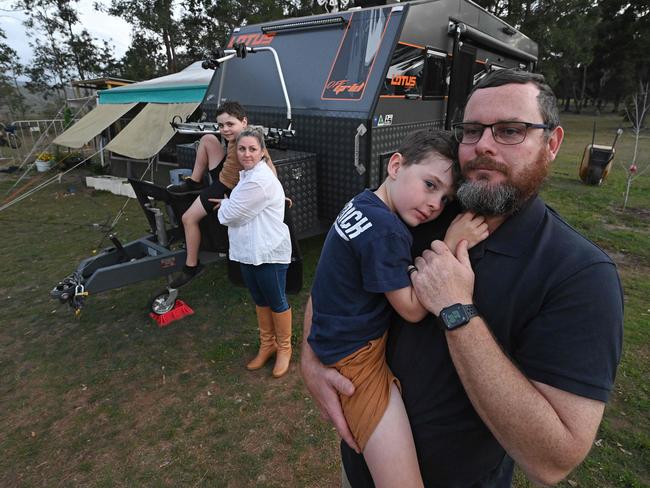
Acting Chief Medical Officer Paul Kelly is helping Mr Morrison develop a definition of a coronavirus hotspot to be put to national cabinet on Friday, which could be used by state governments to determine who they can let in.
The Morrison government hopes federal and state chief health officers will endorse the definition, forcing any premier who disagrees to explain themselves.
“By Christmas, we must work together to ensure we have the protections in place to protect the health and safety of Australians and to open up our economies and ensure the ambitions of our federation are returned to again,” Mr Morrison said in question time.
“What we have to work to do is to let Australians know that, by Christmas, they will be able to come together. By Christmas, they will be able to come together as families and look to a 2021 that doesn’t look like the difficulties that they’ve gone through in 2020.”
READ the full story here
Courtney Walsh 5.45am: AFL family heads north for historic day
The AFL’s most treasured prize, the premiership cup, left Melbourne bound for Queensland, in the surest sign this year’s decider will be held in Brisbane.
It was not quite on the league’s last flight out of city — the AFL chartered three flights north for the last wave of superstars, families, executives and support staff.
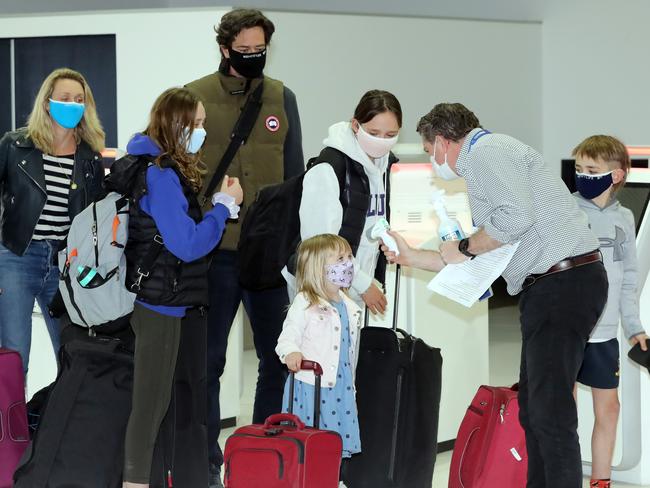
Gary Ablett Jnr, his wife Jordan and son Levi were 3pm departures, nestled among a swag of Geelong Cats personnel keen to support a leading premiership contender.
AFL chief executive Gillon McLachlan and his family were on the final flight out of a city that prides itself on being the home of Australian football.
But not in 2020. And that was enough to leave Collingwood president Eddie McGuire, who was accompanied by a son, a little choked up.
“I’ve really felt a bit emotional today, about the fact that today we’ll probably find out that the grand final officially is not going to be in Melbourne for the first time ever,” McGuire said.
READ the full story here
Richard Ferguson 5.30am: $30bn JobKeeper and flexible IR extension passes
Reduced JobKeeper wage subsidies and flexible pandemic workplace rules will last until March after parliament approved Josh Frydenberg’s $30bn extension plans on Tuesday.
After failed attempts to amend the legislation by Labor, the Greens and crossbench senators, the omnibus bill extending JobKeeper passed the upper house on the voices.
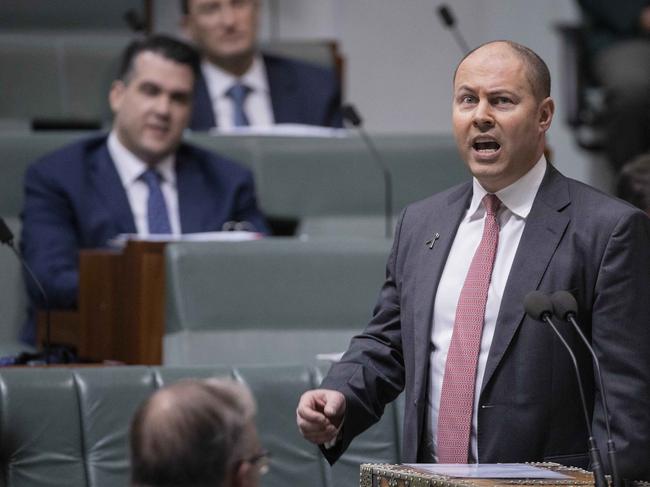
The Treasurer told the House of Representatives moments later that the extension, bringing the total cost of JobKeeper to $101bn, will save jobs and businesses.
“JobKeeper is supporting more than 3.5 million Australian workers and around one million Australian businesses, Mr Speaker … with, effectively, an extra $30bn being put to work on behalf of the Australian people,” he said.
“Labour market flexibility has been critical to the JobKeeper businesses being able to keep their doors open and to keep their staff employed through this crisis … The JobKeeper program is helping to keep people in a job.”
From September 31, JobKeeper payments will fall to $1200 a fortnight for full-time workers and $750 for part-time employees.
In January, payments will fall again to $1000 for full-time workers and $600 for part-timers.
READ the full story here

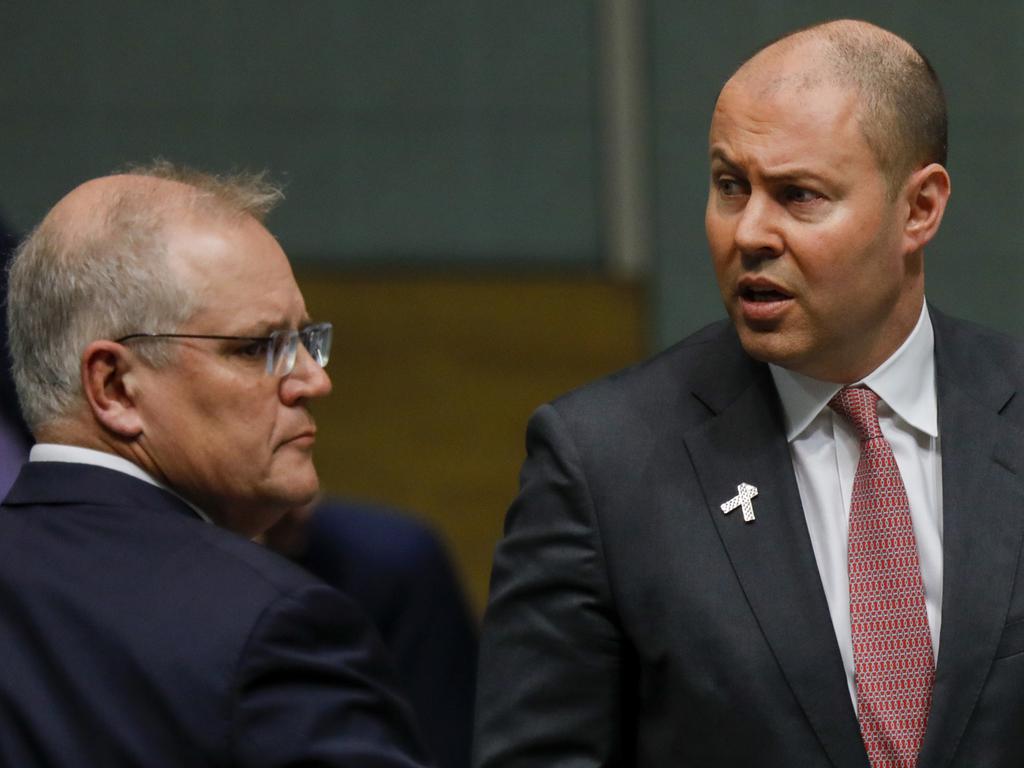
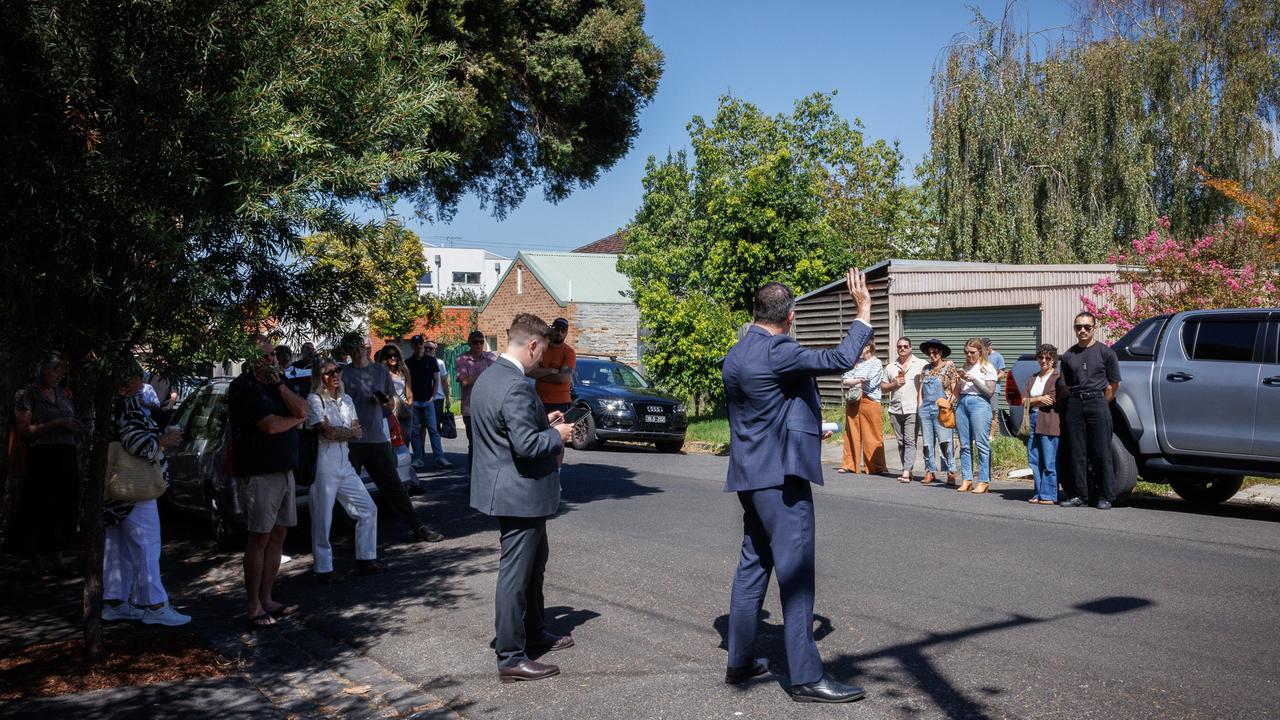
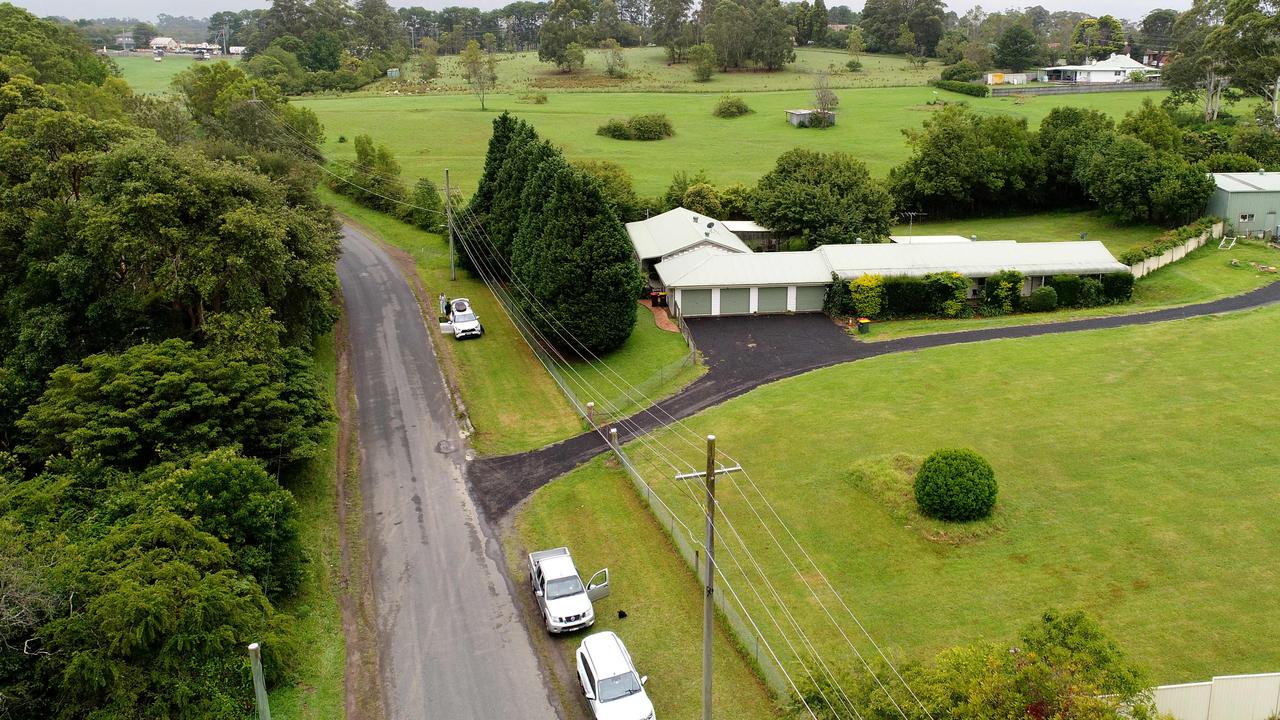
To join the conversation, please log in. Don't have an account? Register
Join the conversation, you are commenting as Logout